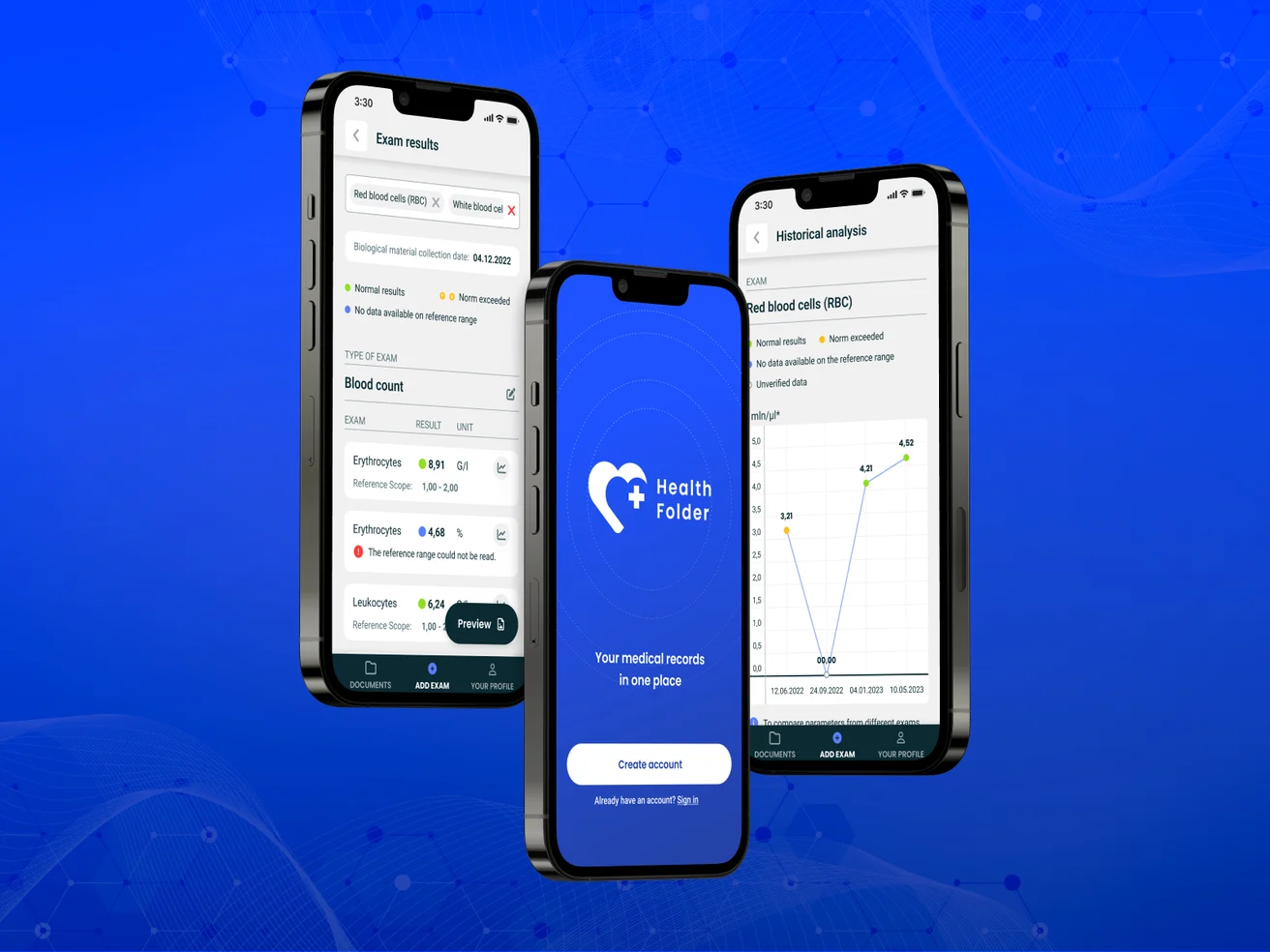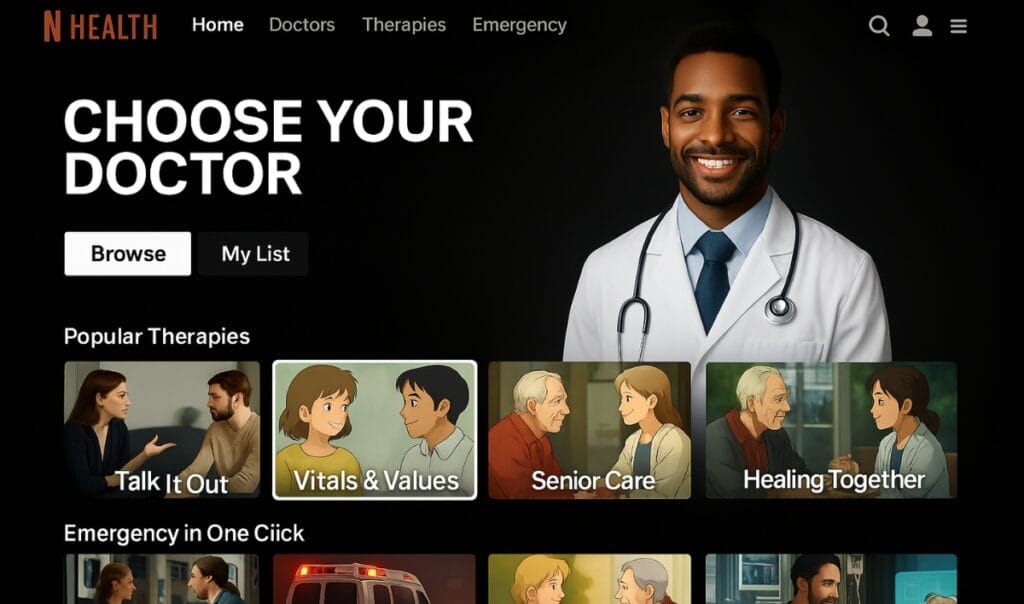Custom physical therapy apps
Empowering therapists with personalized, effective, and tech-driven custom apps.
We're experts in building HIPAA-compliant physical therapy apps
Patient data protection
We build custom physical therapy apps that adhere to HIPAA standards. This not only ensures compliance but also guarantees the highest level of user data protection.
Intuitive user experience
Our product owners ensure user-friendly interfaces in our custom physical therapy apps, striving for easy navigation and a seamless user experience.
Exercise library & tracking
Our custom physical therapy apps can include features like a comprehensive exercise library with progress tracking to monitor and adapt patient rehabilitation.
Technology integrations
We ensure seamless integration with wearable health devices, patient portals, and other healthcare systems to ensure maximum convenience and interoperability.
Health Folder: Your AI-based digital medical documentation folder
Discover how Health Folder revolutionizes medical documentation management with its AI-powered mobile app built using low code.
Read the case study
Our digital health software development process
This is how we work
Deliver & Scale
- Product Development
- DevOps Architecture
- Continuous User Feedback & Delivery
Custom physical therapy app development FAQ
Everything you need to know about physical therapy apps to decide if you need a top-tier custom solution.
What are physical therapy apps?
Physical therapy apps are mobile applications that provide patients with personalized exercises, rehabilitation plans, and support tools to improve their physical condition. These apps are designed to complement traditional physical therapy sessions, allowing patients to continue their rehabilitation journey at home or on the go.
What Is HIPAA compliance?
The Health Insurance Portability and Accountability Act (HIPAA) is a federal law that sets standards for the protection of health information. HIPAA applies to all healthcare providers, including telemedicine providers.
To ensure our products are HIPAA compliant, we implement a number of security measures, such as using encryption to protect patient data and conducting regular security risk assessments.
Do physical therapy apps need to comply with HIPAA regulations?
Whether or not a physical therapy app needs to comply with HIPAA regulations depends on the specific app and how it collects, stores, and uses patient health information (PHI).
HIPAA-covered entities are healthcare providers, health plans, and healthcare clearinghouses that are subject to the HIPAA Privacy Rule. If a physical therapy app is owned or operated by a HIPAA-covered entity, then the app must comply with HIPAA.
Business associates are any companies or individuals that provide services to a HIPAA-covered entity that involve the use or disclosure of PHI. If a physical therapy app is developed or maintained by a business associate of a HIPAA-covered entity, then the app must also comply with HIPAA.
Apps that do not collect or transmit PHI are not subject to HIPAA. However, even if an app does not collect or transmit PHI, it is still important to protect the privacy of user information. This includes avoiding the collection of unnecessary information, encrypting data, and limiting access to PHI to authorized personnel.
Here are some specific factors to consider when determining whether a physical therapy app needs to comply with HIPAA:
- Does the app collect patient information, such as name, date of birth, medical history, or treatment plan?
- Does the app store patient information on the user's device or in a remote server?
- Does the app share patient information with third parties, such as insurance companies or other healthcare providers?
- Does the app use patient information for marketing or other purposes?
If you are unsure whether a physical therapy app needs to comply with HIPAA, it is best to err on the side of caution and ensure that the app meets HIPAA requirements. This will help protect the privacy of your patients' information.
What are the benefits of physical therapy apps for patients?
Physical therapy apps offer numerous benefits for patients, including:
- Increased accessibility: Apps provide convenient access to exercise routines and rehabilitation plans anytime, anywhere.
- Enhanced adherence: Apps can help patients stay on track with their exercise programs and achieve better outcomes.
- Remote monitoring: Apps can enable physical therapists to remotely monitor patients' progress and adjust their plans accordingly.
- Enhanced motivation: Apps can provide engaging and motivating feedback, encouraging patients to stick with their rehabilitation goals.
- Recordkeeping and tracking: Apps can help patients track their progress and provide valuable data for their physical therapists.
Are VR solutions used in physical therapy?
Yes, virtual reality (VR) is increasingly being incorporated into physical therapy practice. VR apps offer a unique immersive experience that can enhance rehabilitation effectiveness by:
- Providing realistic environments: VR can simulate real-world scenarios, allowing patients to practice skills and movements in a safe and controlled environment.
- Overcoming pain perception: VR can distract patients from pain sensations, making exercises more tolerable and encouraging better compliance.
- Motivating and engaging patients: VR's immersive nature can make rehabilitation more enjoyable and motivating for patients.
What are the essential features of physical therapy apps?
Essential features of physical therapy apps include:
- Tailored exercise plans: Apps should provide personalized exercise programs based on the patient's specific needs and health condition.
- Progress tracking: Apps should allow patients to track their progress, monitor their performance, and set achievable goals.
- Video demonstrations: Apps should feature high-quality video demonstrations of exercises to ensure proper technique and form.
- Remote communication: Apps should facilitate communication between patients and physical therapists, enabling real-time feedback and adjustments.
- Adaptive features: Apps should adapt to the patient's progress and ability, providing personalized challenges and modifications as needed.
Can you provide a list of criteria for evaluating physical therapy apps?
When evaluating physical therapy apps, consider the following criteria:
- Reliability and accuracy: Ensure the app's exercise instructions and recommendations are based on sound clinical evidence and verified by qualified physical therapists.
- User-friendliness: The app should be easy to navigate and use, with a user-friendly interface and clear instructions.
- Customization: The app should allow for personalized exercise plans and adjustments based on the patient's individual needs and progress.
- Progress tracking and data visualization: The app should effectively track progress, provide meaningful data visualizations, and allow for the generation of reports for healthcare providers.
- Remote communication and support: The app should facilitate communication between patients and physical therapists, enabling remote monitoring, feedback, and adjustments.
- Security and privacy: The app should prioritize patient privacy and data security by implementing robust encryption protocols and adhering to HIPAA regulations.
- Professional endorsement: Consider apps that have been endorsed or consulted with reputable physical therapy associations or organizations.
It’s truly been a partnership. Pragmatic Coders have an in-depth understanding of our client base and what services we provide, anticipating needs and addressing them by adding new features into our system. Their team makes sure that there is a shared understanding so that what they deliver meets my organization's and our clients’ expectations.

Our other healthcare software services
Medical Practice Management Software Development
Learn moreLet's talk
We’ve got answers on anything connected with software development.
Message us
Feel free to reach out using the form below, and we’ll get back to you as soon as possible.
Schedule a meeting
You can also schedule an online meeting with Wojciech, our Senior Business Consultant.

founders who contacted us wanted
to work with our team.
Check our digital health-related articles
Newsletter
You are just one click away from receiving our 1-min business newsletter. Get insights on product management, product design, Agile, fintech, digital health, and AI.






